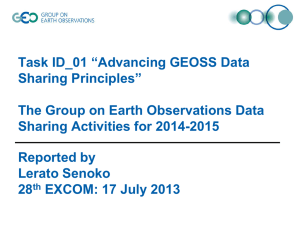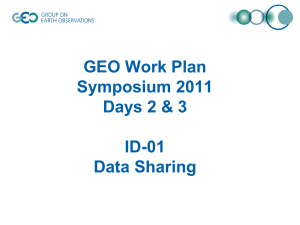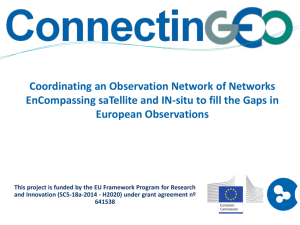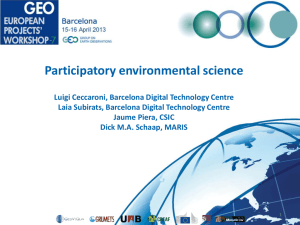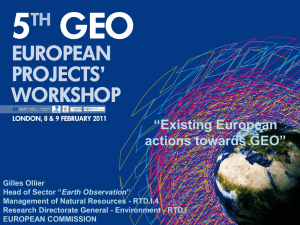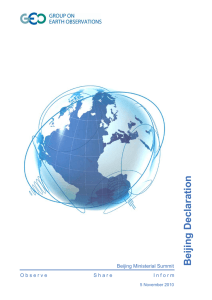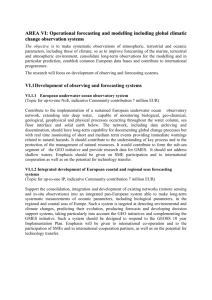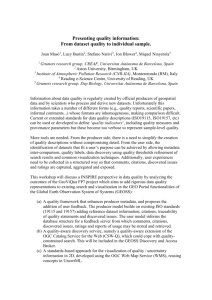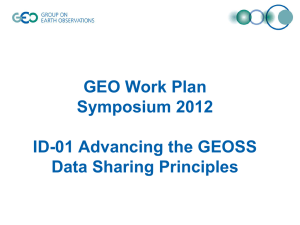Identifying benefits and challenges arising from the voluntary provision of... Christine Heumesser , Steffen Fritz
advertisement
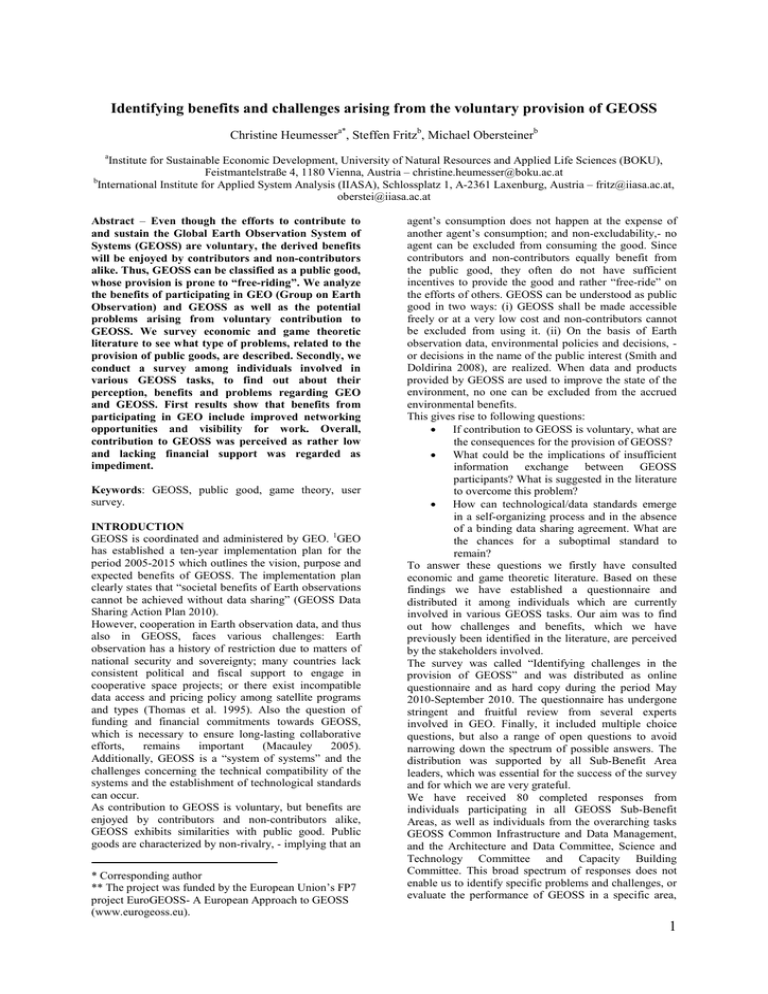
Identifying benefits and challenges arising from the voluntary provision of GEOSS Christine Heumessera*, Steffen Fritzb, Michael Obersteinerb a Institute for Sustainable Economic Development, University of Natural Resources and Applied Life Sciences (BOKU), Feistmantelstraße 4, 1180 Vienna, Austria – christine.heumesser@boku.ac.at b International Institute for Applied System Analysis (IIASA), Schlossplatz 1, A-2361 Laxenburg, Austria – fritz@iiasa.ac.at, oberstei@iiasa.ac.at Abstract – Even though the efforts to contribute to and sustain the Global Earth Observation System of Systems (GEOSS) are voluntary, the derived benefits will be enjoyed by contributors and non-contributors alike. Thus, GEOSS can be classified as a public good, whose provision is prone to “free-riding”. We analyze the benefits of participating in GEO (Group on Earth Observation) and GEOSS as well as the potential problems arising from voluntary contribution to GEOSS. We survey economic and game theoretic literature to see what type of problems, related to the provision of public goods, are described. Secondly, we conduct a survey among individuals involved in various GEOSS tasks, to find out about their perception, benefits and problems regarding GEO and GEOSS. First results show that benefits from participating in GEO include improved networking opportunities and visibility for work. Overall, contribution to GEOSS was perceived as rather low and lacking financial support was regarded as impediment. Keywords: GEOSS, public good, game theory, user survey. INTRODUCTION GEOSS is coordinated and administered by GEO. 1GEO has established a ten-year implementation plan for the period 2005-2015 which outlines the vision, purpose and expected benefits of GEOSS. The implementation plan clearly states that “societal benefits of Earth observations cannot be achieved without data sharing” (GEOSS Data Sharing Action Plan 2010). However, cooperation in Earth observation data, and thus also in GEOSS, faces various challenges: Earth observation has a history of restriction due to matters of national security and sovereignty; many countries lack consistent political and fiscal support to engage in cooperative space projects; or there exist incompatible data access and pricing policy among satellite programs and types (Thomas et al. 1995). Also the question of funding and financial commitments towards GEOSS, which is necessary to ensure long-lasting collaborative efforts, remains important (Macauley 2005). Additionally, GEOSS is a “system of systems” and the challenges concerning the technical compatibility of the systems and the establishment of technological standards can occur. As contribution to GEOSS is voluntary, but benefits are enjoyed by contributors and non-contributors alike, GEOSS exhibits similarities with public good. Public goods are characterized by non-rivalry, - implying that an * Corresponding author ** The project was funded by the European Union’s FP7 project EuroGEOSS- A European Approach to GEOSS (www.eurogeoss.eu). agent’s consumption does not happen at the expense of another agent’s consumption; and non-excludability,- no agent can be excluded from consuming the good. Since contributors and non-contributors equally benefit from the public good, they often do not have sufficient incentives to provide the good and rather “free-ride” on the efforts of others. GEOSS can be understood as public good in two ways: (i) GEOSS shall be made accessible freely or at a very low cost and non-contributors cannot be excluded from using it. (ii) On the basis of Earth observation data, environmental policies and decisions, or decisions in the name of the public interest (Smith and Doldirina 2008), are realized. When data and products provided by GEOSS are used to improve the state of the environment, no one can be excluded from the accrued environmental benefits. This gives rise to following questions: • If contribution to GEOSS is voluntary, what are the consequences for the provision of GEOSS? • What could be the implications of insufficient information exchange between GEOSS participants? What is suggested in the literature to overcome this problem? • How can technological/data standards emerge in a self-organizing process and in the absence of a binding data sharing agreement. What are the chances for a suboptimal standard to remain? To answer these questions we firstly have consulted economic and game theoretic literature. Based on these findings we have established a questionnaire and distributed it among individuals which are currently involved in various GEOSS tasks. Our aim was to find out how challenges and benefits, which we have previously been identified in the literature, are perceived by the stakeholders involved. The survey was called “Identifying challenges in the provision of GEOSS” and was distributed as online questionnaire and as hard copy during the period May 2010-September 2010. The questionnaire has undergone stringent and fruitful review from several experts involved in GEO. Finally, it included multiple choice questions, but also a range of open questions to avoid narrowing down the spectrum of possible answers. The distribution was supported by all Sub-Benefit Area leaders, which was essential for the success of the survey and for which we are very grateful. We have received 80 completed responses from individuals participating in all GEOSS Sub-Benefit Areas, as well as individuals from the overarching tasks GEOSS Common Infrastructure and Data Management, and the Architecture and Data Committee, Science and Technology Committee and Capacity Building Committee. This broad spectrum of responses does not enable us to identify specific problems and challenges, or evaluate the performance of GEOSS in a specific area, 1 but gives us general idea about the current perception of GEO and GEOSS. In the next sections we will pick up our three leading questions, introduce results from the literature and present first results of our survey. 1. CHALLENGES IN THE PROVISION OF GEOSS 1.1. Voluntary participation to provide a public good The GEOSS process is exemplary for the difficult provision of a public good: Contribution to GEOSS is non-binding. The GEOSS tasks and their members, which provide the GEOSSs’ components, are selforganizing and self- financing units. In achieving their goals, the GEO secretariat plays a facilitating role but does not offer any financial support. The question emerges how committed contribution to GEOSS can be ensured. A broadly used example for the provision of public goods is the establishment of an International Environmental Agreement (IEA). Similar to GEOSS, no country can be forced to sign an IEA, and if it does, can withdraw from the agreement at any time. Barrett (1994) suggests that there exists a tradeoff between the breadth and depths of an agreement: There is a high degree of cooperation when the net benefits between full cooperative and noncooperative outcome are small. Even though literature suggests that the socially optimal size of participation to an agreement on a public good is high degree/full cooperation, self-organized cooperation can only induce low participation. However, an external institution, even with little or no enforcement powers, can help to strategically frame a situation such that cooperation is mutually desirable. This includes revealing situations where most benefits can be achieved; by influencing the issues which are negotiated, or by the modification of accession and abrogation rules (e.g. Carraro and Marchiori 2003, Carraro and Siniscalco 1995, Yi 2003, Yi and Shin 2000); linkage of negotiations (e.g. Carraro and Marchiori 2003, Carraro and Siniscalco 1995); or side payments (e.g. Carraro and Marchiori 2003); proposal to establish multiple agreements at a time, i.e. various agreements according to the specific interests or financial endowments of agents (e.g. Finus and Rundshagen 2003, Yi and Shin 2000). An external coordinating institution, such as the GEO secretariat, is crucial to successfully achieve the goals of cooperation. The self-reliant establishment of mutually profitable contracts has not proven effective in sustaining cooperation among a large number of agents. On the other extreme, an external institution trying to establish a binding agreement could fail in doing so because it lacks information about the agents to design an effective agreement. Table A. presents some of the benefits which respondents perceive resulting from their participation in GEO. These can as well be understood as incentives, enabled by the GEO secretariat, to engage in further collaboration. These incentives seem not sufficient to achieve more collaboration: Around 50% of respondents perceived contribution to GEOSS as too little. 34 of the 80 respondents give suggestions on how contribution to GEOSS could be increased. The most successful measures were perceived to be financial support (29%), or proofing the success of GEOSS’ concept (21%). Table A. Benefits derived from the cooperation in GEO perceived by the respondents of our questionnaire (N = 80, results are given in %) Degree of agreement: Very much 2 3 4 Very little No answer Political support for your work Increased visibility for your work Improved network opportunities 11 31 29 14 6 9 16 50 16 10 3 5 35 38 14 9 3 3 1.2. Informational constraints In the past, unawareness among the participants in GEOSS about each others’ research and contributions has been observed. Accordingly, our study reveals that ~ 41% of respondents perceive that the degree of interaction within the respective tasks is rather low. Are the current reporting mechanisms from the tasks to the GEO secretariat, but also from the GEO secretariat to the public sufficiently established? Akerlof (1970) depicts the collapse of a market as consequence of informational asymmetries: buyers lack information about the state of the assets offered in the market, high quality assets and assets of lower quality sell at the same price. Low quality assets bring down the average price and drive the high quality assets out of the market. This explains, what is already intuitive: that lacking information in cooperation for GEOSS can lead to lower than possible outcome. Overgaard (1991) adds that by repeated interaction low quality assets or characteristics can be weeded out of the market, which seems to be a positive prospect for long-lasting cooperation to provide GEOSS. At this stage, a coordinating institution such as the GEO secretariat can provide incentives to foster and monitor communication. Around 41% of respondents perceive that there is too little interaction within the tasks, whereas 15% find that very much interaction happens within the task. Suggested activities such as funding projects, or funding the participation in meetings and workshops were named as possible solution to this problem. 1.3. Standard setting and the role of a technological leader GEOSS is a ‘system of systems’ where technical standardization and interoperability of the components has to be ensured: how can standards emerge in a selforganizing process? Interoperability and data compatibility clearly yields increased benefits,- or network effects, for all participants. Similar to the provision of a public good, benefit increase when the size of the network increases. However, there are reasons for not being the first to engage in the creation of a standard or network. Bliss and Nalebuff (1984) or Melissas (2005) show how agents delay the private provision of a public good, hoping that others will undertake these steps first; because pioneering entry results in immediate losses to the entrant until other agents join the network as well. These economic concepts suggest that the first-mover bears additional costs and therefore refrains from exerting effort. Hence, standard 2 setting in GEOSS could encounter difficulties or be delayed. Out of the 80 respondents, 42 told us about their expectations of GEOSS and whether these were realized. Out of these, 41% named data sharing and the development and coordination of common data standards as main expectations. However, it was perceived that much of this activity was not yet realized and there was too little coordination of the data. However, the responses were considerably optimistic about the success of future efforts. 2. CONCLUSION This analysis focused on the potential benefits and problems arising from the voluntary nature of GEOSS. We focus on economic and game theoretic literature and present first results of a qualitative survey targeting contributors to GEOSS-tasks from all Sub-benefit Areas and some Committees. The leading questions discussed here are by far not exhaustive and do not cover the complexity of the GEOSS process. From the literature we find that most processes concerning the provision of a public good demand an external institution as coordinator, which sets incentives to achieve the respective goal. Similarly, asymmetrically distributed information and insufficient communication can be a major barrier to the establishment of GEOSS. In the same vein, optimal standard setting and achieving interoperability can be jeopardized without guidance of an external institution. The GEO secretariat fulfills this role by providing guidance for the GEOSS components, establishing a framework for cooperation and providing political approval for the tasks. The respondents of our survey state clearly that participating in GEO increases the visibility of their work, offers political support and provides valuable networking opportunities. However, apart from these benefits, the main expectations were the provision of a data sharing regime, which has not yet been realized, but is progressing as desired. However, contribution to GEOSS is seen as too little, also the degree of interaction between the GEOSS’ participants is seen as too low. Both of these problems are suggested to be resolved by means of providing funding for activities related to GEOSS. If not for the projects to attract noncontributors to the GEOSS process, than funding for meetings could at least increase communication and consequently progress within the tasks. However, to accomplish a sustainable use of GEOSS, also a timely integration of user communities in the design, implementation and utilization of GEOSS is necessary. The dimension and necessity of user integration has so far been neglected in our study, but will be vital to ensure the sustainability of GEOSS past 2015. 3. REFERENCES G. Akerlof, “The Market for ‘Lemons’: Quality Uncertainty and the Market Mechanism,” The Quarterly Journal of Economics 84 (3), p.p. 488–500, 1970. C. Bliss, and B. Nalebuff, “Dragon-slaying and ballroom dancing: The private supply of a public good,” Journal of Public Economics 25(1–2), p.p. 1–12, 1984. C. Carraro, and C. Marchiori, “Stable coalitions,” in: C. Carraro (ed.), “The Endogenous Formation of Economic Coalitions”, Cheltenham: E. Elgare, p.p.156–198, 2003. C. Carraro, and D. Siniscalco, “Policy coordination for sustainability: Committments, transfers and linked negotiations,” In: I. Goldin and L.A. Winters (ed.), “The Economic of Sustainable Development”, Cambridge: Cambridge University Press, p.p. 264–282, 1995. M. Finus, and B. Rundshagen, “Endogenous coalition formation in global pollution control: a partition function approach”. In C. Carraro (ed),.”The Endogenous Formation of Economic Coalitions”. E. Elgar, Cheltenham, p.p.199–243, 2003. M. Macauley, “Is the vision of the Earth Observation Summit realizable?” Space Policy 21, p.p. 29–39, 2005. N. Melissas, “Herd behaviour as an incentive scheme”, Economic Theory 26, 517–536, 2005. P. Overgaard, “Product quality uncertainty. Strategic information transmission in product markets with adverse selection and adverse incentives”. PhD Thesis. Université Catholique de Louvain, 1991. L.J. Smith, and C. Doldirina, “Remote sensing: A case for moving space data towards the public good”, Space Policy 24, p.p. 22–32, 2008. G.B. Thomas, J.P. Lester, and W. Sadeh, “International cooperation in remote sensing for global change research: political and economic considerations”, Space Policy II (2) p.p. 131–141, 1995. S.-S. Yi, “Endogenous formation of economic coalitions. A survey of the partition function approach”, In: C. Carraro (ed.), “The Endogenous Formation of Economic Coalitions”. Cheltenham: E. Elgar, p.p. 80–127, 2003. S.-S. Yi and H. Shin, “Endogenous formation of research coalition with spillovers”, International Journal of Industrial Organization, 18: 229–56, 2000. GEOSS Data Sharing Action Plan Document 7(Rev2) As accepted at GEO-VII, 2010. http://www.earthobservations.org/documents/geo_vii/07_ GEOSS%20Data%20Sharing%20Action%20Plan%20Re v2.pdf, last accessed February 2011. ACKNOWLEDGEMENTS We would like to thank everyone who was involved in designing, reviewing, distributing and filling out our questionnaire. In particular, Jay and Francoise Pearlman and Douglas Cripe for their valuable comments and effort. S. Barrett, “Self-Enforcing International Environmental Agreements,” Oxford Economic Papers, Special Issue on Environmental Economics, 46, p.p. 878–894, 1994. 3 4
